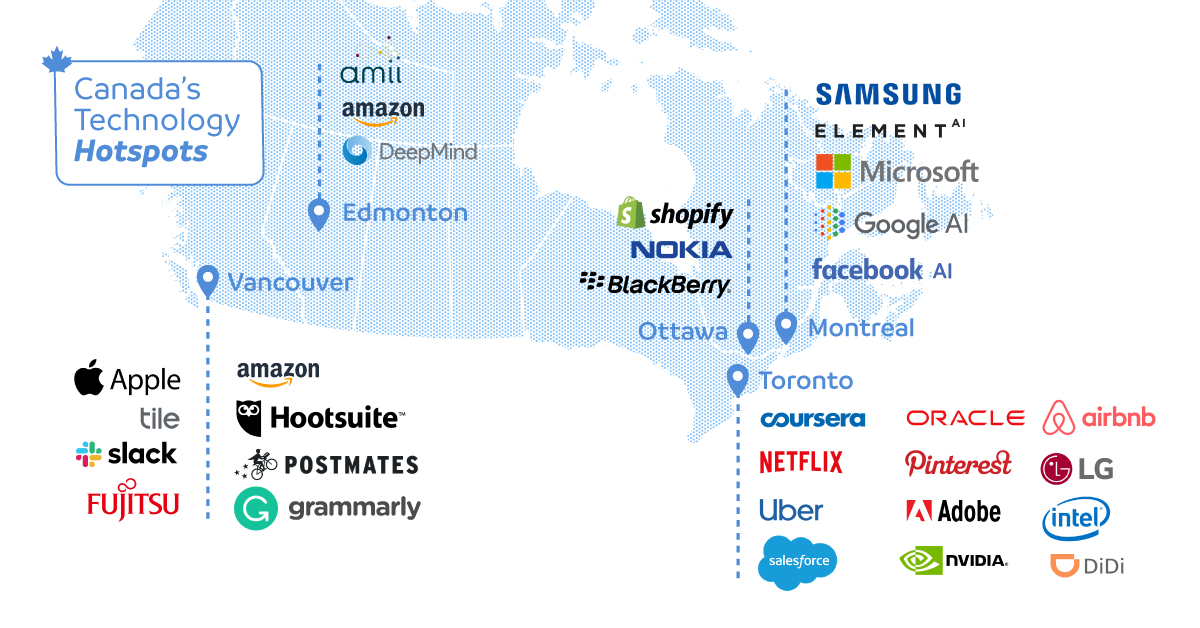Investing in Canada: the Silicon Valley of the North
The following content is sponsored by the Canadian Consulate in San Francisco.

Investing in Canada: the Silicon Valley of the North
The fastest-growing tech hubs are no longer limited to the San Francisco Bay Area. Canadian cities have emerged as ideal ecosystems for nurturing technology companies.
In particular, Toronto, Edmonton, Montreal, and Vancouver are well-known hubs for innovation, attracting some of the world’s top tech talent.
Today’s graphic from the Canadian Consulate in San Francisco highlights why Canada’s booming tech industry is attractive to foreign companies, and where the new avenues for growth are located.
Investing in Canada’s Tech Sector
Canada is an attractive market for foreign investors and corporations.
- Free Trade: Canada is the only country that freely trades with every G7 nation
- Innovation: The tech startup ecosystem in Canada ranks 3rd in the world
- Stability: Canada’s social and political climate ranks in the top 20 most stable worldwide
Foreign direct investment (FDI) into Canada is fueling this growth. In just a year, FDI grew by 70%—from $32.2 billion in 2017 to $54.7 billion in 2018. There are three primary types of FDI:
| Type | Description | Example |
|---|---|---|
| Horizontal | Same type of business established in a foreign country | Cell phone provider in the U.S. opens stores in Canada |
| Vertical | Different but related business established or acquired in a foreign country | U.S. manufacturer acquires a Canadian supplier of parts or raw materials required for its products |
| Conglomerate | An investment made in a business unrelated to the foreign investor’s existing business | Joint venture between a Canadian Artificial Intelligence (AI) company and a U.S. company with no experience in AI |
For many years, Canada has maintained an open flow of trade, investment, and talent with other nations. That’s why many well-known foreign companies are flocking to the “Great White North” to attract world-class talent.
Who’s Got Talent: Hiring the Best
Canada is an emerging leader in talent attraction. The influx of FDI and skilled immigrants has sparked the “brain gain” throughout Canada’s tech sector.
The Global Skills Strategy (GSS) is a recent federal program that fast tracks immigration for highly-skilled workers applying directly to Canada or through U.S. companies. In 2018 alone, the GSS received over 10,000 applications─with a 96% success rate for approved work visas.
Shorter processing times for Canadian work visas are enabling more efficient immigration. Canadian visas are now processed within 10-14 days, compared with the typical U.S. timelines of 6-10 months.
Locally, Canadian tech talent has also grown formidable. Notable experts in AI, deep learning, and technology have pursued lucrative research and career opportunities in Canada.
Canadian Tech Pioneers
- Yoshua Bengio: 2018 Turing Award, University of Montreal
- Richard Sutton: Google DeepMind, University of Alberta
- Joelle Pineau: Facebook AI Research (FAIR), McGill University
- Geoffrey Hinton: Google, 2018 Turing Award, University of Toronto
- Donna Strickland: 2018 Nobel Laureate, University of Waterloo
- Doina Precup: Canadian Institute for Advanced Research (CIFAR) Senior Fellow, McGill University
- Sanja Fidler: NVIDIA Director of AI, University of Toronto
- Hugo Larochelle: Google Brain, CIFAR Associate Director, University of Montreal
Notable accolades include the Turing Award, which is given annually to selected individuals for their contributions “of lasting and major technical importance” to the computer science industry.
Highly skilled professionals such as those listed above are working closely with both renowned academic organizations and major tech companies to foster innovation in Canadian tech.
Show Me the Money: Setting up Shop in Canada
Companies that choose to invest in Canada’s technology sector also have access to several key financial incentives.
- Tax Incentives
Foreign companies can receive corporate tax breaks for investing in a Canadian office. Any research and development (R&D) work may also be eligible for Scientific Research and Experimental Development (SR&ED) tax credits. - Lower Labor Costs
Lower costs of living throughout Canada allows foreign companies to pay lower wages to staff without impacting quality of life. The rent-to-tech wage ratio─the ratio of a tech worker’s monthly housing costs to their monthly wages─is significantly lower in Canada compared to major U.S. tech hubs. For example, Montreal’s ratio is 12.6%, compared to San Francisco’s ratio of 26.4%. - Lower Operating Costs
Setting up a physical office also offers more value per dollar for foreign companies, as most operating costs are significantly lower in Canada.
The Canadian tech industry is consistently boosting job growth, tech innovation, and wealth creation─all important considerations for foreign companies and investors.
Attracting Foreign Companies to Canada
Many view Canada as a land of opportunity─ the country consistently ranks highly on global happiness, thanks to its stable politics, social factors, and strong economy.
With quality talent and lower costs, Canada is fertile ground for U.S. and foreign tech companies seeking to grow their businesses and global reach.
-

 Sponsored3 years ago
Sponsored3 years agoMore Than Precious: Silver’s Role in the New Energy Era (Part 3 of 3)
Long known as a precious metal, silver in solar and EV technologies will redefine its role and importance to a greener economy.
-

 Sponsored7 years ago
Sponsored7 years agoThe History and Evolution of the Video Games Market
Everything from Pong to the rise of mobile gaming and AR/VR. Learn about the $100 billion video games market in this giant infographic.
-

 Sponsored8 years ago
Sponsored8 years agoThe Extraordinary Raw Materials in an iPhone 6s
Over 700 million iPhones have now been sold, but the iPhone would not exist if it were not for the raw materials that make the technology...
-

 Sponsored8 years ago
Sponsored8 years agoThe Industrial Internet, and How It’s Revolutionizing Mining
The convergence of the global industrial sector with big data and the internet of things, or the Industrial Internet, will revolutionize how mining works.


